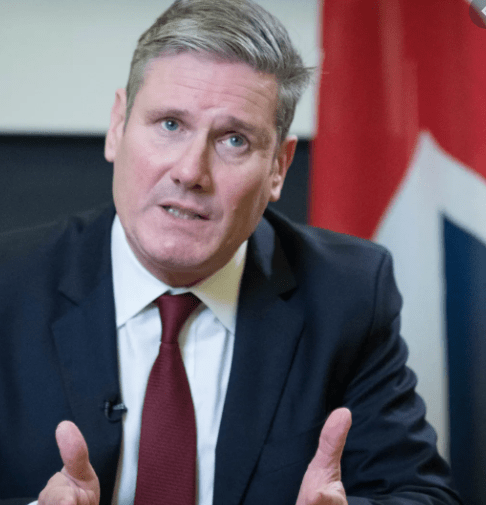If Keir Starmer used half as much energy attacking the Tories as he does attacking the left of his own party, Rishi Sunak would not last a week. Starmer has promised that he is prepared for a “dirty and nasty” campaign against the left, even before the next general election.
This is not a promise to get “dirty and nasty” against a government that is cutting living standards more than any in living memory, or against cutting the NHS and public services to the bone. It is not a promise to get “dirty and nasty” fighting the profiteering of energy companies, or privatised water utilities pouring sewage into rivers and streams, or against private landlords hiking rents up twice as fast as inflation. Any commitments of that kind would be election winners. No, he issues, instead, a declaration of war on his own party left wing.
Starmer was speaking at the annual conference of Progressive Britain, the mis-named right-wing faction formerly known as Progress. He not only addressed the conference, but through a circular to its supporters, urged them to attend. Progressive Britain is not the only right-wing faction in the party, but it is the largest, with its own membership, members’ fees, meetings, conferences and full-time organisers, a ‘party within a party’.
Knowing his audience, therefore, the Labour leader was more open than he would be if he were addressing Labour members in general. He says out loud what he has been thinking all along. Starmer “claimed his project of reforming the party in the aftermath of the Corbyn era must go further and deeper than Tony Blair’s”. (Guardian, May 13). The Guardian described his plan as “Clause IV on steroids”. It now seems that Starmer and those around him will be bringing forward new party rules even before the next general election, to consolidate the grip of the right wing.
Corbynism was a shock of historic proportions
The British political establishment had a shock of historic proportions when Jeremy Corby was elected Labour leader in 2015, and again in 2016. For the first time in two generations, there was a Labour leader who threatened to trample on the sacred ground of rent, interest and profit upon which British capitalism stands.
The Corbyn leadership was supported by a surge of members joining the Labour Party, all supporting the idea of change. It was an influx of hundreds of thousands, but it reflected the aspirations of millions for a new kind of Labour politics.
It took five years of sniping, sabotage, obstruction and smears – supported by the BBC and the mainstream media – for the right-wing to make their comeback, via Starmer. Even then, he would never have been elected leader had he not made his fraudulent ‘ten pledges’, which were binned as soon as he took office.
After Corbyn, the right-wing faction around Starmer – who are the political representatives of the establishment – are determined to make it impossible for the left to ever come back again. So far, they have changed the rules of the Labour Party to make the disciplinary process easier to attack the left; they have rigged the process of election of leader so the threshold to get on the ballot needs the support of more MPs. Corbyn has been unceremoniously exiled and is not allowed to stand for Labour again.
Labour apparatus following a blantantly factional agenda
More important has been the ‘informal’, but no less stultifying, suppression of democracy by Labour’s bureaucracy, making up new rules or bending old ones. The apparatus of the Party, from the General Secretary downwards, has followed a blatantly factional agenda, suspending or expelling members on the flimsiest pretexts, suspending CLPs and branches, and generally casting a pall of gloom over the life of the Party.
Members in constituencies and Labour branches are no longer able to select candidates democratically, for either local or parliamentary elections and invariably the regional office imposes its own rules and candidates. In some regions the Regional Executive committee rarely meets, if at all. The daily life of the Party revolves around decrees from regional and national officials in a way that has never happened at any time in its history.
It is not clear what new Party rules the Starmer faction will now try to bring forward to a Labour Party conference. But the key question is this: to what extent will the trade union leaders – even those on the right – be prepared to let him get away with it?
Before the 2021 Labour conference, the Trade Union and Labour Party Liaison Organisation, TULO – in its national form, mostly made up of union general secretaries – rejected a proposal from Starmer to change the method of election of the Party leader back to an electoral college system. Starmer was obliged to drop the idea.
Right wing unions have enable Starmer’s rightward moves
How willing will the leaders of affiliated unions be to wholesale rule changes at a Labour conference now? The leaders of the three large right wing unions, USDAW, GMB and UNISON, have backed Starmer so far, and they have effectively enabled all of his backtracking on policies and moves to the right. In doing so, they have acted directly against the interests of their own members, who are not consulted when their union reps vote on Labour’s NEC.

But it is not a foregone conclusion that these same union leaders will swallow large scale rule changes again. If they were to follow their personal instincts they would, but the voice of their members is going to grow to a crescendo in the coming months, as the crisis in living standards is reflected inside the unions. While Starmer might hard of hearing, faced with the urgent demands of their members, the trade union leaders will find that feigned deafness is not such an easy option for them.
There is a clear political rationale behind Keir Starmer’s commitment to turn the Labour Party into a new version of the Liberal Party, and he let slip the reasons for his wish to euthanise the left. He has finally come to the realisation, unlike many of his supporters, that an incoming Labour government will not be able to repeat what Blair did. The next election, as Left Horizons has repeatedly argued, will not be a repeat of 1997.
“If you think our job in 1997 was to rebuild a crumbling public realm,” Starmer said to the assembled right-wing, “that in 1964 it was to modernise an economy overly dependent on the kindness of strangers, in 1945 to build a new Britain, in a volatile world, out of the trauma of collective sacrifice – in 2024, it will have to be all three.”
It is a realisation, although not in so many words, that the crisis of British capitalism will force the Labour government to carry through counter-reforms. In a briefing sent out to Labour Party members, there are suggestions that the Labour manifesto to be published soon will include policies to improve rights at work, to invest billions in green energy, to reform childcare and to expand NHS staffing. But like other ‘pledges’ Starmer has made, these will be hard to put into effect in the context of the dire position of British capitalism.
Starmer oppposes re-nationalisation
All of those proposals would be welcomed by Labour and trade union members, although it has to be said that there are important areas of policy that the Starmer team avoid, to maintain ‘fiscal balance’. There is the profiteering of energy, rail, water, and other privatised companies like Royal Mail. (It is Labour Party conference policy to renationalise these businesses). There is the scandal of private sector landlordism and the unaffordability of housing. There are no major policy announcements from Starmer on these pressing issues.
Faced with strikes and opposition to their policies on all fronts, the Tories have imposed ever more drastic laws to limit strikes and minimise any dissent, giving police such powers to stop protests as would not be out of place in Putin’s Russia.
The Tories have introduced measures to suppress voting. The official figures show 1.2% of voters turned away at polling stations two weeks ago, half of them (as intended) from minority ethnic backgrounds, although this is only the numbers recorded inside the polling stations. The real figure is likely to be at least twice that.
Yet, almost as a mirror-image of the creeping totalitarianism inside the Labour Party, the Starmer team has rejected the idea of repealing the anti-democratic legislation carried through by Tory governments since 2010. Dissent inside the party is already forbidden. Dissent against a Labour government may need to be ‘discouraged’ just as much.
Left Horizons would prefer a majority Labour government
Politics is not crystal ball-gazing and looking ahead is always a matter of probabilities rather than certainties. But based on opinion polls, it still looks most likely that Labour will be elected to office. The Starmer faction would prefer – whatever they say to Labour members – to be in a minority Labour administration, so that they were then ‘obliged’ to do a deal with the Lib-Dems. That would provide a fig-leaf for what in any case would be Tory-lite policies.
But despite the subjective wishes of the Starmer team, Labour may achieve a majority government and we would prefer that to be the case, because it removes the ‘excuse’ of having to rely on Lib-Dem MPs in Parliament for Labour to pass legislation.
Whether he sees himself being at the head of a majority or a minority government, at the Progressive Britain conference Starmer was preparing the ground for counter-reforms and for a ‘Labour’ version of austerity and cuts. His vision of a “new partnership between politics and working people” is a cover, not for meaningful improvements in the daily lives of the working class, but for counter-reforms. Even the very modest reforms that may be outlined in a manifesto will be watered down or dumped.
It is with this in mind that Starmer let slip, that “I have always known it is going to get dirty and nasty”. He added for good measure, “That is the nature of our politics.” That is indeed the nature of right-wing Labour politics.
Starmer and the right-wing faction around him want to forestall the inevitable opposition that will develop to a Labour version of austerity inside the movement. He may succeed in changing the rules of the Party to minimise opposition in Constituency Labour Parties, but his reach does not extend so decisively into the structures of the trade unions. It is there that opposition to Labour austerity will develop and it is there that it must be encouraged.



